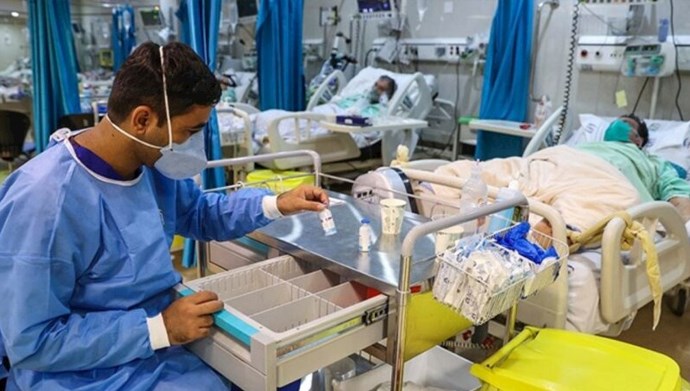Reporting by PMOI/MEK
Iran, March 24, 2021—On March 22, Amnesty raised concern on the conditions of prisoners of conscience in Iran on Nowruz and called for their release.
Among these prisoners are Maryam Akbari Monfared, Atena Daemi, and Ali Younesi.
Akbari has passed her thirteenth Nowruz behind bars. She is imprisoned for protesting to the 1988 massacre of 30,000 political prisoners, which included two of her siblings, a brother and a sister. At that time, based on a fatwa of the then supreme leader Ruhollah Khomeini, all prisoners who remain steadfast on their political believes were executed. Most of them were members and sympathizers of the People’s Mojahedin Organization of Iran (PMOI/MEK).
مریم اکبری منفرد ۱۳مین #نوروز متوالی را در حبس ناعادلانه سپری میکند. او به دلیل دادخواهی کشتار ۶۷ مورد انتقام گیری و انواع رفتارهای بیرحمانه و غیرانسانی قرار گرفته است.
او باید فورا و بدون قید و شرط آزاد شود.
حقیقتیابی و دادخواهی حق تمام بازماندگان اعدامهای دهه ۶۰ است. pic.twitter.com/If0nuhRsxX— Amnesty Iran (@AmnestyIran) March 22, 2021
Maryam Akbari Monfared in constantly under brutal and inhuman torture and pressures. “She must be released immediately. Seeking truth and justice is the right of all survivors and families of the 1988 massacre,” Amnesty tweeted.
Atena Daemi, another political prisoner, is going through her sixth Nowruz in prison. Amnesty International emphasized, “The brutal treatment of Atena by the Iranian authorities is a bitter example of the repression of those who work for the realization of a free and justice Iran. She must be released immediately and unconditionally.”
On March 11, the Iranian regime filed a new case against Daemi, charging her with “assembly and colluding to disrupt the country’s security,” “propaganda against the system” and “disturbing the prison order.” The regime regularly resorts to bogus charges to extend the prison sentences of political prisoners. Regime authorities summoned Daemi without giving her lawyers the chance to represent her in the new case. She has been denied access to a lawyer since her conviction in her previous case. She has also been barred from visits since last year.
آتنا دائمی، مدافع حقوق بشر ششمین #نوروز خود را در زندان سپری میکند.
رفتار بیرحمانه مقامات ایران با آتنا دائمی نمونهای تلخ از سرکوب افرادی است که برای تحقق ایرانی عاری از بیعدالتی فعالیت میکنند.
او باید فورا و بدون قید و شرط آزاد شود. pic.twitter.com/bIERhiltLP— Amnesty Iran (@AmnestyIran) March 20, 2021
Ali Younesi, a young student, is also spending Nowruz behind bars this year. Younesi and another student, Amir Hossein Moradi, went missing on April 10, 2020. After 26 days, the Iranian regime’s judiciary admitted to having apprehended them and holding them in custody.
Ali Younesi and Amir Hossein Moradi were accused with trumped-up charges such as being engaged in “diversionary actions” and “attempting to carry out sabotage operations.” Likewise, Amnesty International called for their immediate release.
علی یونسی #نوروز را در حبس ناعادلانه و به دور از خانوادهاش میگذراند. او تنها بر اساس ادعای داشتن نسبت خانوادگی با اعضای گروههای مخالف نظام، هدف بازداشت بیضابطه قرار گرفته است.
مقامات ایران باید او را فورا و بدون و قید شرط آزاد کنند. pic.twitter.com/opBRD1jpi7
— Amnesty Iran (@AmnestyIran) March 20, 2021
Soheil Arabi, a political activist and blogger, has spent more than eight years prison for defending the freedom of speech in Iran. “[Soheil Arabi] has been tortured and cruelly mistreated by Iranian authorities for years and is now spending another Nowruz in prison,” Amnesty tweeted.
In 2019, Arabi released an open letter from inside the notorious Evin Prison titled, “When corruption is legitimate and legal.” In the letter, Arabi details how prison officials benefit from intensifying restrictions on prisoners.
In September 2020, Arabi was sent to solitary confinement and placed under severe pressure for exposing the inhumane conditions of the Tehran Greater Prison, where he was incarcerated at the time.
سهیل عربی تنها به خاطر استفاده از حق آزادی بیان، ناعادلانه زندانی شده است و سالهاست که از سوی مقامات و مسئولان مورد شکنجه و سایر رفتارهای بیرحمانه و غیرانسانی قرار گرفته است و اکنون #نوروز دیگری را در زندان سپری میکند.
او باید بیدرنگ و بدون قید و شرط آزاد شود. pic.twitter.com/ZvH0OOzN40— Amnesty Iran (@AmnestyIran) March 22, 2021
Amnesty also raised concern about the conditions of Arash Sadeghi, a well-known human rights defender who is under severe pressure in Rajai Shahr Prison, Karaj.
“[Arash] is spending Nowruz behind bars while he shouldn’t have been in prison for a single day,” Amnesty tweeted.
It is worth noting that Sadeghi suffers from cancer. Prison authorities torture him by regularly denying him medical care.
آرش صادقی، مدافع حقوق بشر سالهاست که به خاطر فعالیتهای حقوق بشری در حبس ناعادلانه است و مورد شکنجه و برخوردهای بیرحمانه و غیرانسانی قرار گرفته است.
او #نوروز دیگری را در زندان سپری میکند در حالی که حتی یک روز هم نباید زندانی میشد.
او باید فورا و بدون قید و شرط آزاد شود. pic.twitter.com/pxdiaxU3cw— Amnesty Iran (@AmnestyIran) March 20, 2021
While many political prisoners are under constant phycological and physical torture and pressure, the regime’s deputy Judiciary Chief Ali Bagher Kani claimed, “The bad situation of political prisoners in Iran is a game being played by Western countries and has no justification or reference.”
This is while many of these prisoners have contracted Covid-19 due to the contamination of prisons. The regime refused to release many of these prisoners for medical treatments. An example is Fatemeh Mosanna, who was in critical health conditions in February. Mossana suffers from chronic colitis and severe migraines and has been suffering from intestinal bleeding since summer. Doctors say that she isn’t physically fit for prison conditions and her continued incarceration in this condition will further deteriorate her health.





